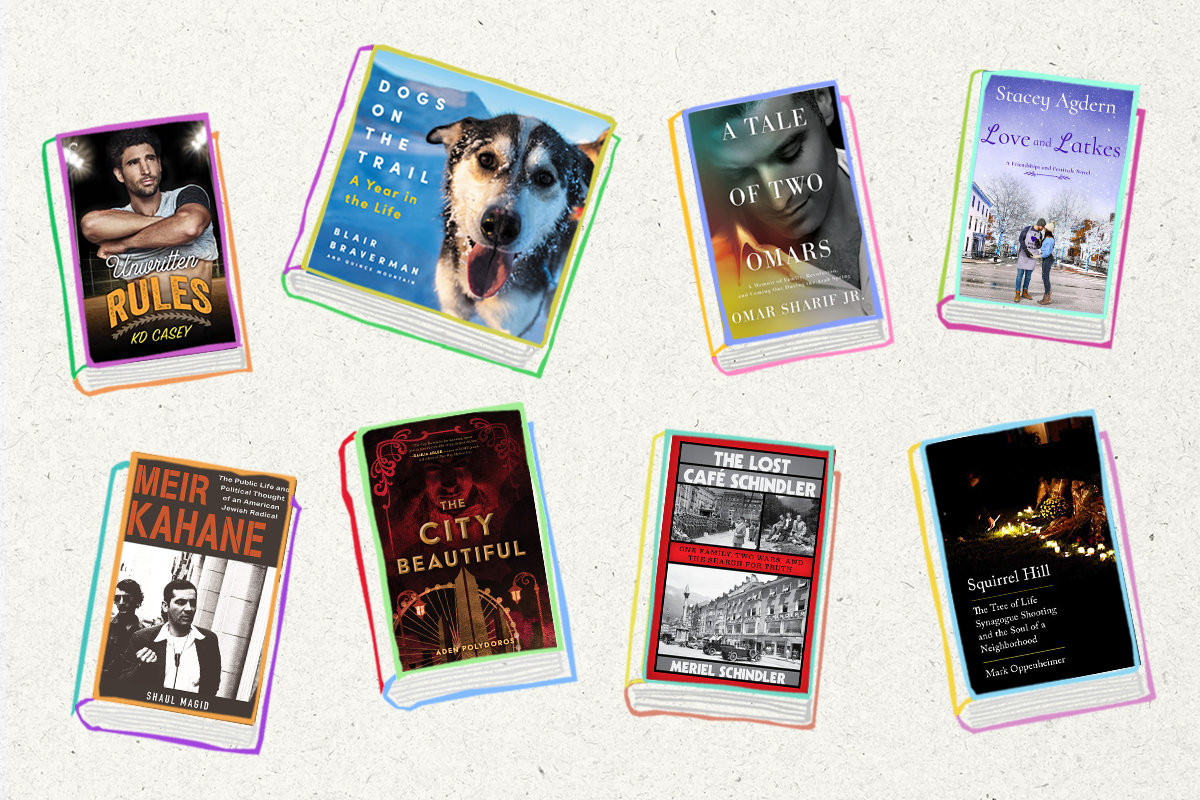October brings many of my favorite things: foliage, arguably perfect weather in the NYC metro area, candy corn (fight me), 31 Nights of Halloween (iykyk), rewatching “Hocus Pocus,” dressing my dog up in a Halloween costume and seeing other dogs in Halloween costumes, and on and on. In addition to all the joys of spooky season, October is simply the perfect time to sink your teeth into a good book — especially a good Jewish book — so here are eight new Jewish titles we’re super excited about this month. (Even more autumn book recommendations this way.) As always, most of this list is shoppable on Bookshop, a platform supporting independent bookstores.
1. The City Beautiful by Aden Polydoros (October 5)
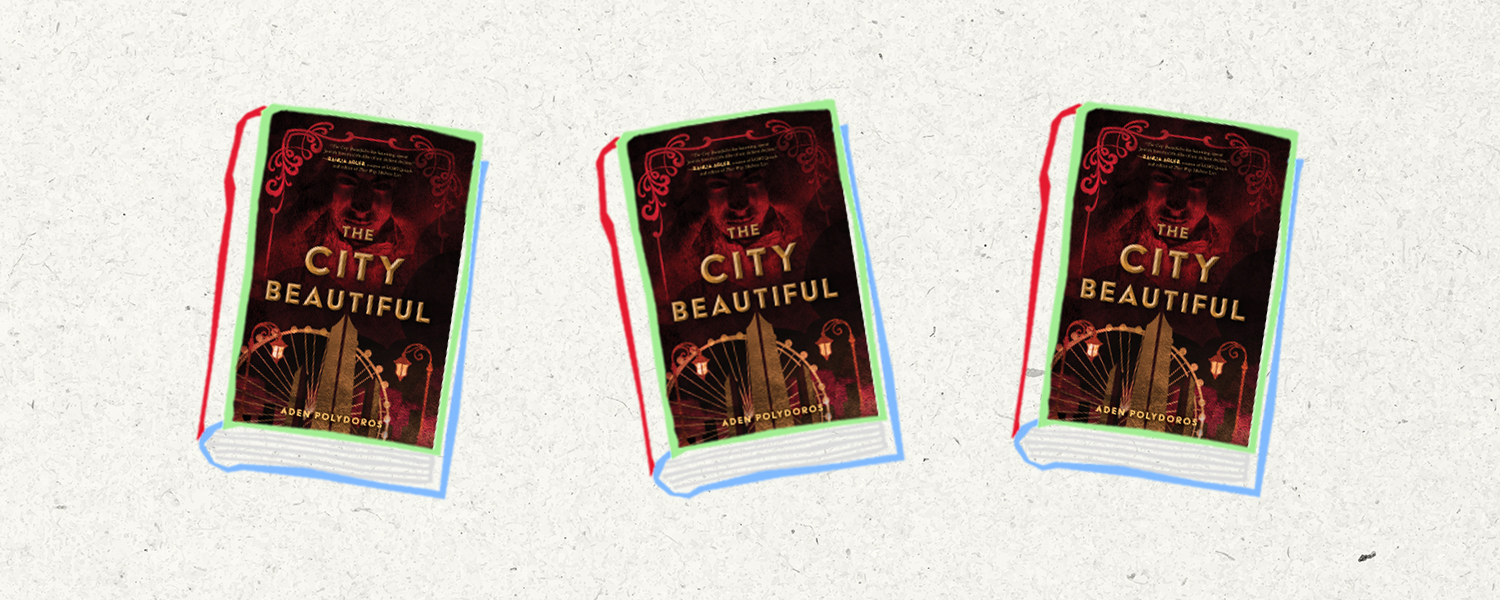
Set in Chicago in 1893, “The City Beautiful” focuses on Alter Rosen, an observant young Jew working at a newspaper setting type, hoping to save up to bring his mother and sisters over from Romania. He volunteers at a chevra kadisha, the local burial society, and when his roommate, Yakov, is murdered, Alter realizes that young Jewish men disappearing are part of a bigger conspiracy. Soon, he sets out to solve the murder with the help of Frankie, a dangerous boy from his past, and Raizel, a headstrong young woman.
Aden Polydoros writes in his author’s note that the book was inspired by “anger and indignation — at the anti-Semitism I have faced in my own life, at the perpetual cycle of violence, at the fact that I cannot go into a synagogue or Jewish community center without first thinking of where a shooter might enter. I wanted to write a book where the Jewish characters… fought back and rose above the people who wished to them harm.”
I love how “The City Beautiful” is so effortlessly Jewish — in its reflections on Jewish assimilation, immigration, queerness, antisemitism and tradition — while also a compelling fantasy/mystery with elements of Jewish mysticism (dybbuks, or “clinging demons,” play a huge part in the plot). And throw in a gay love story… I mean, Polydoros literally wrote this book for the Alma audience. As Dahlia Adler wrote, “Chillingly sinister, warmly familiar, and breathtakingly transportive, ‘The City Beautiful’ is the haunting, queer Jewish historical thriller of my darkest dreams.” It truly is.
Read if you’re into: queer Jewish historical fantasy! Also, reading spooky mysteries during a spooky time of year!! The Jewish angle: Aden Polydoros is Jewish, as are the main characters. Get it here. Bonus: Read an interview with Aden Polydoros on “The City Beautiful” here.
2. A Tale of Two Omars by Omar Sharif Jr. (October 5)
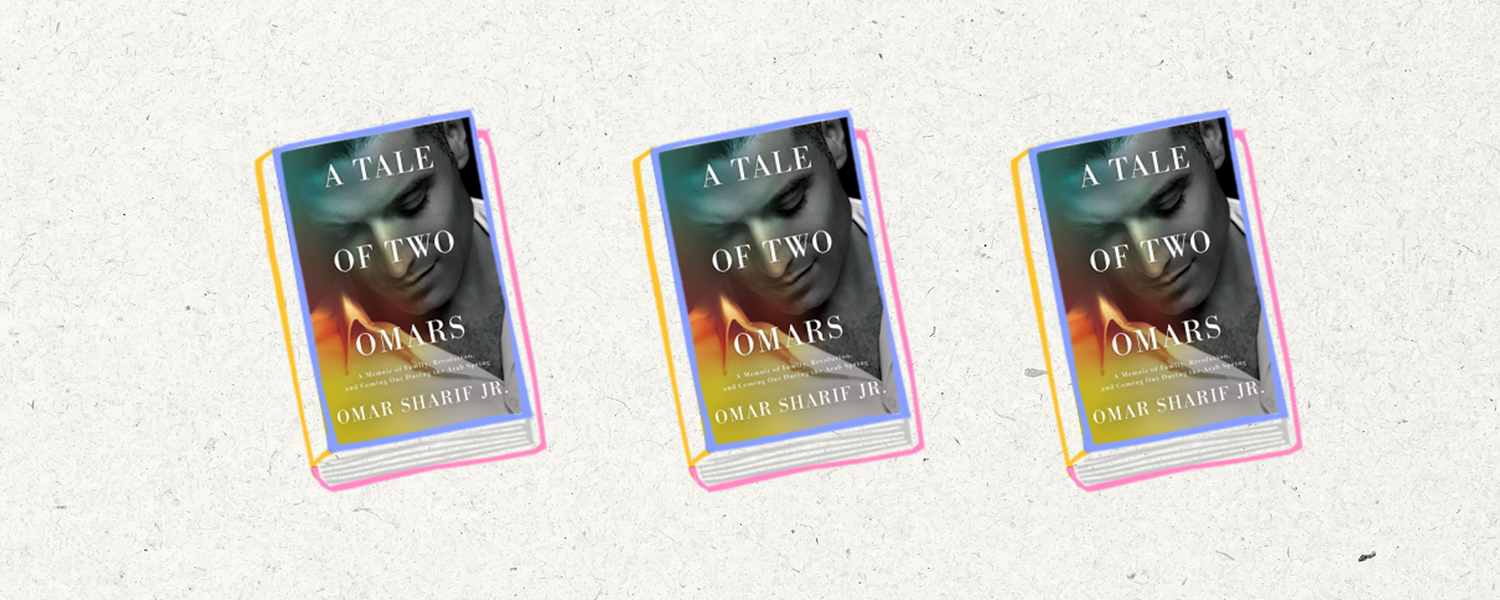
Omar Sharif Jr. is gay, Muslim and Jewish. His mother is a Jewish Canadian, his father an Arab Muslim; they divorced when he was young. And, notably, he is the grandson of Holocaust survivors on his mother’s side and Omar Sharif, the famous Egyptian Hollywood actor, and Faten Hamama, an Egyptian actress, on his mother’s side. In 2012, he came out in an essay in The Advocate that soon went viral. In that essay, he writes, “I write this article despite the inherent risks associated because as we stand idle at what we hoped would be the pinnacle of Egyptian modern history, I worry that a fall from the top could be the most devastating. I write, with healthy respect for the dangers that may come, for fear that Egypt’s Arab Spring may be moving us backward, not forward. And so I hesitantly confess: I am Egyptian, I am half Jewish, and I am gay. That my mother is Jewish is no small disclosure when you are from Egypt, no matter the year. And being openly gay has always meant asking for trouble, but perhaps especially during this time of political and social upheaval. With the victories of several Islamist parties in recent elections, a conversation needs to be had and certain questions need to be raised. I ask myself: Am I welcome in the new Egypt? Will being Egyptian, half Jewish, and gay forever remain mutually exclusive identities? Are they identities to be hidden?”
His memoir, “A Tale of Two Omars,” takes us up to that moment and what followed. He writes in a manner that is like a good friend telling you a story — his narration sucks you in and makes you not want to put it down. He dives into Egyptian society, what it means to live in exile and how to balance all his different identities. “I’m not an activist,” Sharif Jr. writes. “I’m just a person with a story.” And what a compelling story it is.
Read if you’re into: memoirs, queer stories, Muslim-Jewish stories. The Jewish angle: Author Omar Sharif Jr. is Jewish. Get it here.
3. The Lost Café Schindler: One Family, Two Wars, and the Search for Truth by Meriel Schindler (October 12)
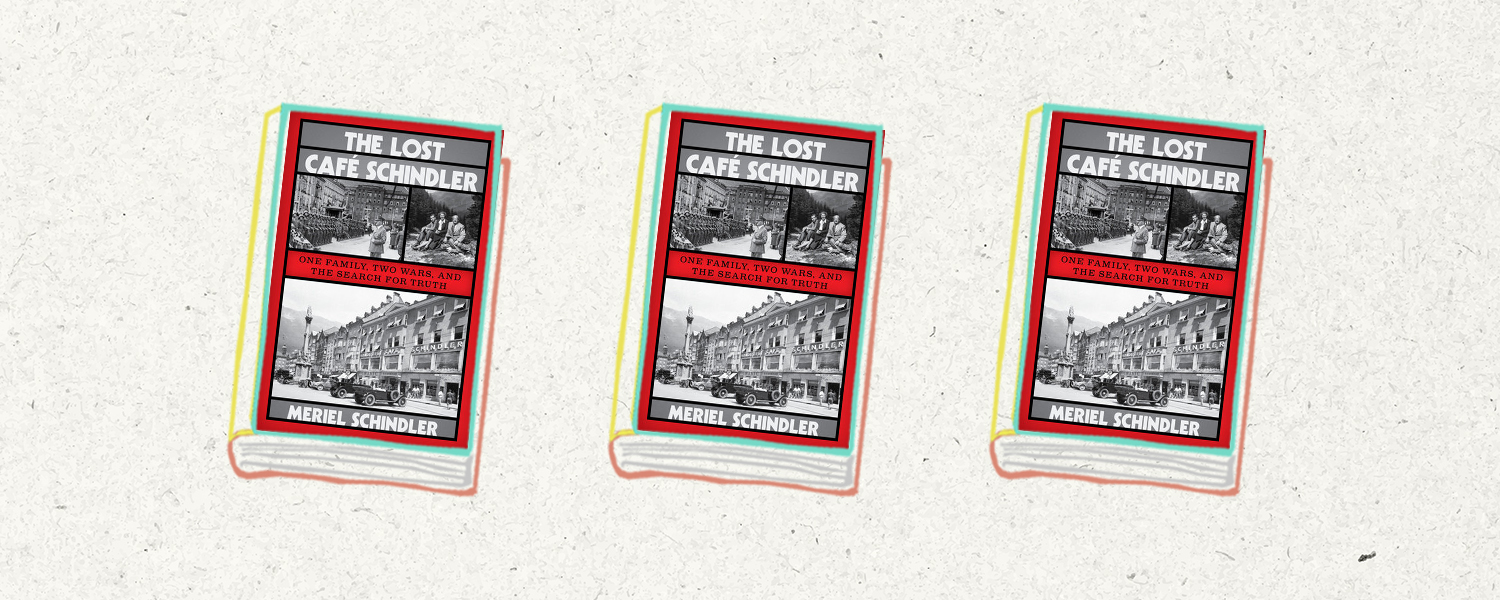
When Meriel Schindler’s father, Kurt, died in 2017, he left behind a remarkable trove of documents and family albums from World War I and World War II. “Never tell anyone you are Jewish,” Kurt would tell Meriel and her sister, Sophie. But, as the sisters started looking through what Kurt left behind, Meriel realized she needed to know the truth behind her family’s history.
“If I was going to understand this maddening man, and to separate fact from fiction, reliable from unreliable memories, I would have to immerse myself in his past and unravel a larger, longer family history,” she writes in the introduction. The lawyer set out to figure out the truth behind her family history, and the result is a powerful memoir, “The Lost Café Schindler,” which re-creates the journey of her family throughout the two World Wars.
The center of the story is Café Schindler, a social hub of Innsbruck, Austria, that her family ran. “Famous for its pastries, home-distilled liquors, live entertainment, and hospitality, the restaurant attracted Austrians from all walks of life. But as conditions became untenable for Jews in Austria during the Nazi era, the Schindlers were forced to leave, and their café was expropriated.” I love the photographs throughout the narrative, and the level of research Schindler put into this book is clear. The story is one of tragedy — as any story of the Holocaust is — but also of finding one’s family.
Read if you’re into: Jewish family history. The Jewish angle: The Schindler family. Get it here.
4. Unwritten Rules by KD Casey (October 12)

In KD Casey’s dreamy gay romance novel, ex-teammates — and exes — reunite at an All-Star game for a second chance. There’s Zach Glasser, a Jewish catcher afraid to come out, and Eugenio Morales, his former teammate (and catcher) who he was in love with. Zach and Eugenio met three years before the start of the book, at spring training when Eugenio was a rookie going for Zach’s spot; even though his roster spot was in jeopardy, Zach helped Eugenio train and work on his skills. Soon, it became something more (squeals!!) but Zach’s reluctance to come out made Eugenio break things off.
There are two timelines at play in “Unwritten Rules”: Zach and Eugenio at spring training, and then three years later after they reunite. Zach feels like a real Jewish athlete — the type of person we’d absolutely cover here at Alma — and his romance with Eugenio is tender and realistic. But it’s not all sunshine and rainbows. Casey doesn’t shy away from homophobia in the sport, financial realities of being in the minor leagues, and more hardships the two players face. Plus, the Jewish details about Zach feel natural — like his parents pressuring him to come home for a synagogue fundraiser, or his mom’s cooking — making the Jewish representation feel very relatable for Jewish readers. All in all, a fantastic Jewish sports romance.
Read if you’re into: baseball, Jewish love stories, queer Jewish love stories, Jewish sports. The Jewish angle: The protagonist, Zach Glasser, is Jewish! As is author KD Casey. Get it here.
5. Squirrel Hill: The Tree of Life Synagogue Shooting and the Soul of a Neighborhood by Mark Oppenheimer (October 5)
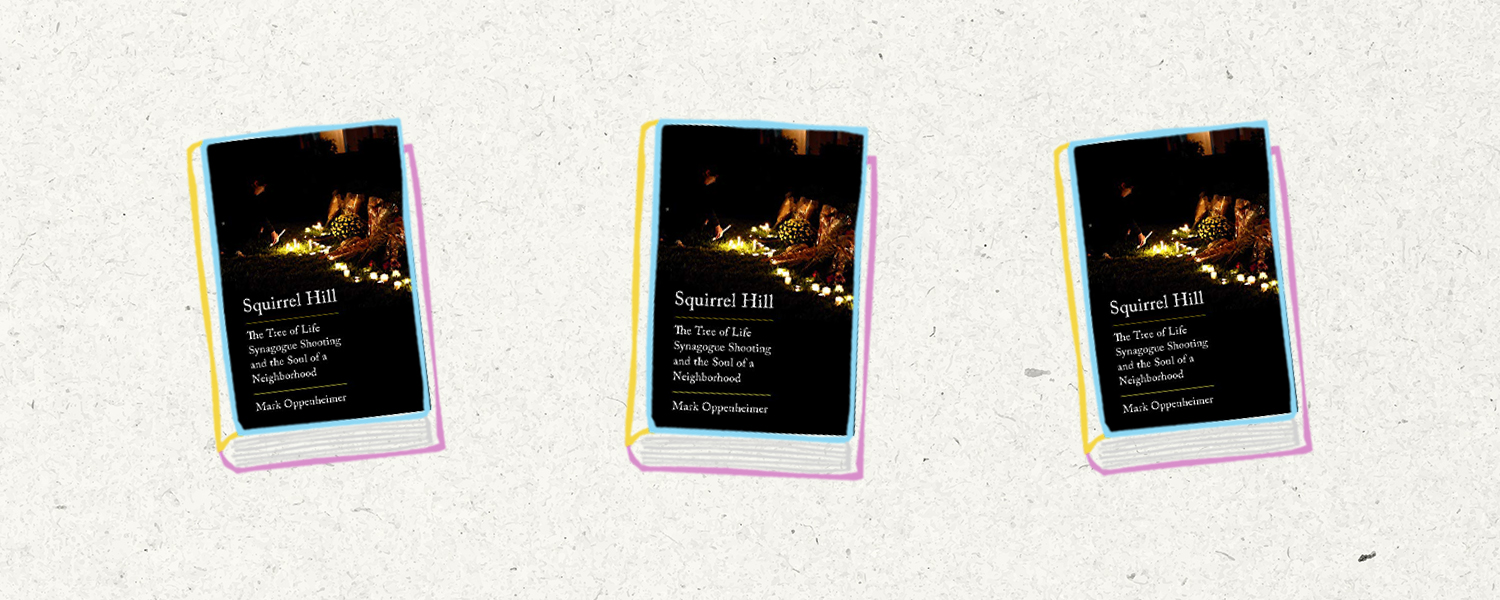
This October, we will observe the third anniversary of the horrific antisemitic attack in Pittsburgh. On October 27, 2018, a white supremacist mass shooter entered the Tree of Life – Or L’Simcha Congregation — in Squirrel Hill, murdering 11 Jews and wounding six. In Jewish journalist Mark Oppenheimer’s book, he looks at the Jewish neighborhood of Squirrel Hill in the aftermath of the shooting. The focus of “Squirrel Hill” is not on the crime, but on the resilience of the neighborhood and the history of the Jews who live there.
Oppenheimer’s great-great-great-grandfather co-founded the first Jewish burial society in Squirrel Hill, and he has clear love for the place. “The gunman who at Tree of Life perpetrated the greatest antisemitic attack in American history surely did not know that he was attacking the oldest, most stable, most internally diverse Jewish neighborhood in the United States,” he writes. Oppenheimer speaks with a wide range of residents — Jews and non-Jews alike — as they try to make sense of the tragedy. It’s hard not to get emotional reading about, and remembering, that terrible day in October 2018. An essential read on a quintessential Jewish American neighborhood.
Read if you’re into: American Jews, thinking about impacts of antisemitic attacks, very solid reporting. The Jewish angle: The whole thing, sadly. Get it here.
6. Dogs on the Trail: A Year in the Life by Blair Braverman with Quince Mountain (October 19)
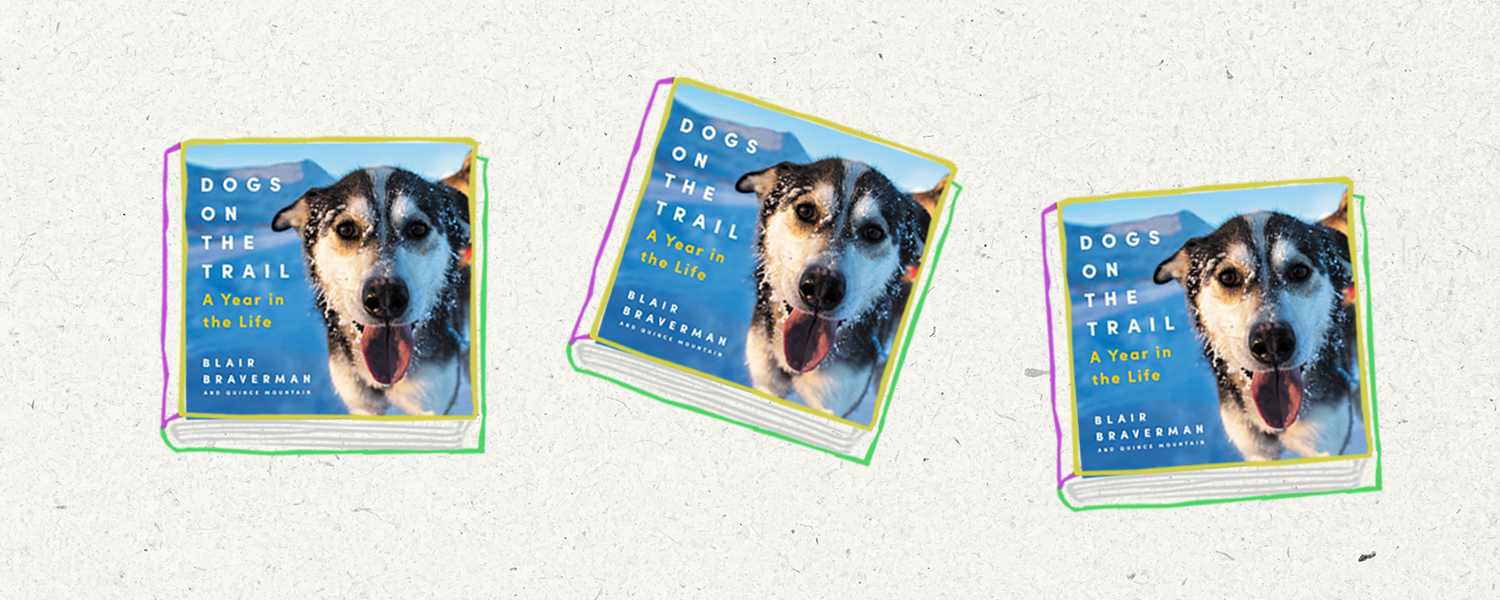
If you’re a longtime reader of Alma, you know our love for Blair Braverman, a Jewish dogsled racer and writer. If you’re not a longtime reader: Hello, welcome, we’re glad you’re here, we love Blair Braverman, 33, who raced and completed the Iditarod — the famous dogsled race — in 2019, and who has an incredible Twitter feed. Her memoir, “Welcome to the Goddamn Ice Cube: Chasing Fear and Finding Home in the Great White North,” is a remarkable tale of a young woman finding herself in the wilderness (seriously, go read it if you haven’t yet).
She’s back with her second book, much lighter fare: a “delightful photographic journey” into a year in the life of a team of sled dogs. Braverman’s Twitter feed, and that of her husband, Quince Mountain, is extremely popular; she’s an expert at storytelling in the medium. Those tweets, and those stories, translated expertly into this book — and it is dedicated to her loyal fanbase online, the #UglyDogs. The book takes you through autumn, winter, mud season and summer, giving readers insight into what her life is like with sled dogs. The photos are beautiful, and her love for her dogs shines through on every page. In the introduction, she writes, “Sled dogs aren’t half-wild, as some supposed… If anything, they’ve taught me to be half-wild: to build a life outdoors, following instincts, trusting my teammates. They’ve taught me that wilderness isn’t a place to visit, but a home to return to. They’ve taught me that there is far less difference between humans and animals than I thought.” A wondrous book.
(Psst. This would make a great Hanukkah gift, just saying.)
Read if you’re into: dogs! Sled dogs! Blair Braverman! The Jewish angle: As Braverman told Alma in 2018, all her dogs are Jewish: “They are proud Jewish sled dogs.” Also, Braverman is Jewish. Get it here.
7. Meir Kahane: The Public Life and Political Thought of an American Jewish Radical by Shaul Magid (October 12)
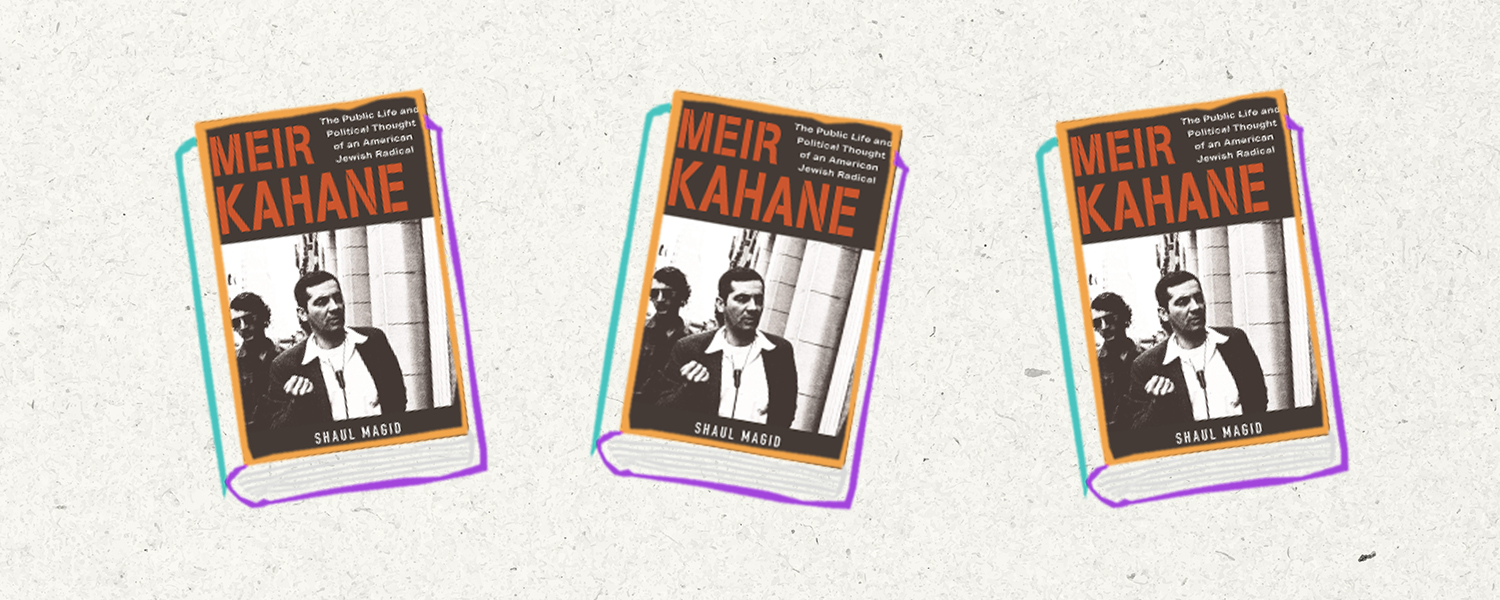
Meir Kahane was a radical American Jewish activist who had a large impact on Israeli politics. Kahane, born in Brooklyn in 1932, was elected to the Israeli Knesset in 1984 on a platform calling for Arabs to be expelled from Israel; he was assassinated in New York City in 1990. But before his violent legacy in Israel, he founded the militant Jewish Defense League (JDL) in 1968. Kahane called for “every Jew a .22” and popularized the slogan “Never Again” — wanting to change the image of young Jewish men. There has not been a comprehensive study on Kahane’s impact on American Jewry until now.
“Meir Kahane” by Shaul Magid dives into Kahane’s outlook, a man he calls “one of the most divisive Jewish figures of the second half of the twentieth century,” and then explores the myriad ways in which Kahane’s ideas — largely shunned at the time — have moved more mainstream, in both America and Israel. (Disclaimer: I was a research assistant for Shaul Magid as he worked on this book.) “Kahane makes most Jews uncomfortable, and rightfully so,” Magid writes in the introduction, “and yet without that discomfort it is too easy to miss crucial fissures and gaping holes in understanding the Jewish experience today. Kahane is the Jew whom Jews would like to forget, and yet he keeps coming back to haunt us.” Magid expertly and thoroughly dives into Kahane’s ideology and legacy today, and it’s a critical read for anyone searching to understand contemporary Jewish identity.
Read if you’re into: American Jewish history, and the American Jewish present. The Jewish angle: Meir Kahane, and author Shaul Magid. Get it here.
8. Love and Latkes by Stacey Agdern (October 12)
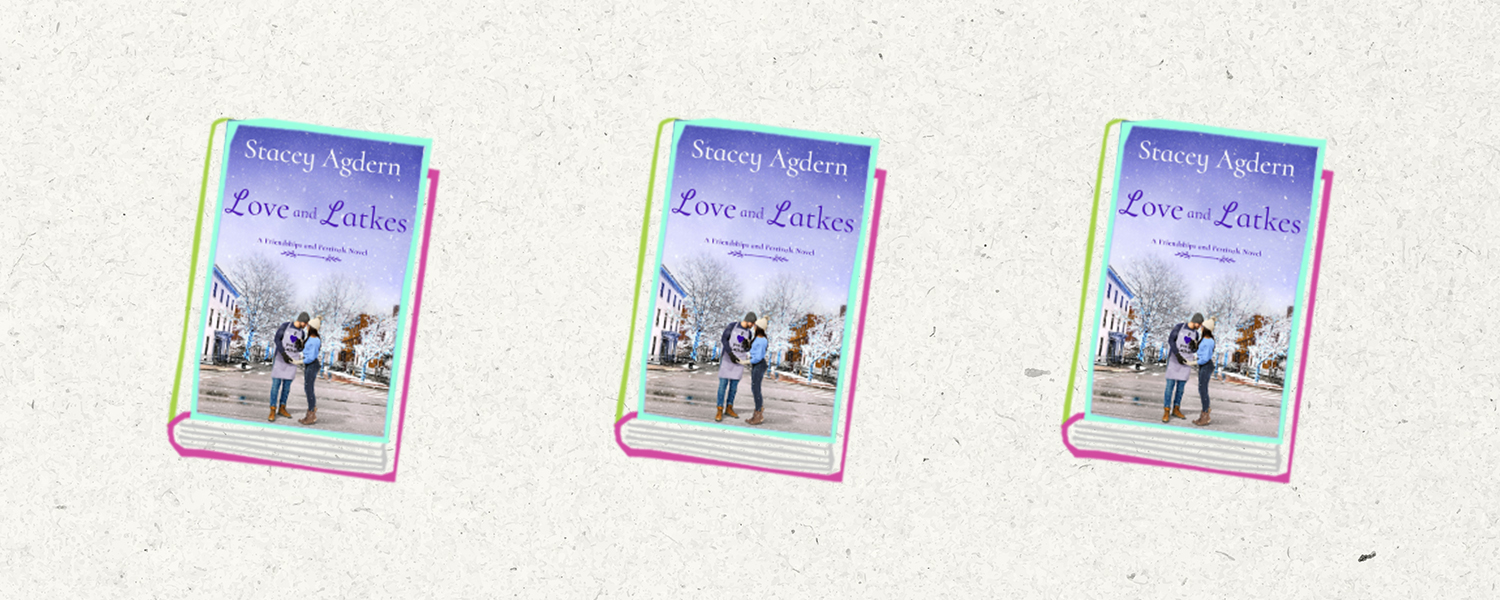
In the third book in her “Friendships and Festivals” romance trilogy, romance writer Stacey Agdern sets the love story at a latke fry-off. Yes, this is a Hanukkah romance novel, and yes, you’re gonna love it. Here’s the synopsis, because I can’t describe it better:
Batya Averman is ecstatic when a latke fry-off committee chooses her as its web designer—until she learns the event is in Rivertown, New York, the hometown she fled years ago. But she’s no longer the girl with an embarrassing history and an unrequited crush on Abe Neumann. This delicious competition is Batya’s chance to further her career, and this time she won’t run.
Abe Neumann can’t pass up the opportunity to enter the town’s latke contest. He dreams of throwing caution to the wind and leaving his accounting firm, opening a Jewish deli, and choosing his own happiness. The prize money would bring him closer to making his dream a reality, but when Batya comes back to town, Abe remembers that a deli isn’t the only thing he’s wished for.
When the fry-off’s celebrity host has to pull out of the competition, Batya is determined to step up to the challenge. This Hanukkah, can Abe fix the past and convince Batya that dreams, like latkes, are better when they’re shared?
I MEAN. *Swoons*. A romance centering on Jewish food with a Hanukkah backdrop? It’s all we could ever wish for and more. (And you don’t need to have read the other two books to read this one, though if you’re interested, the first is “Miracles and Menorahs” and the second is “History of Us.”
Read if you’re into: HANUKKAH ROMANCE NOVELS!! The Jewish angle: IT’S A HANUKKAH ROMANCE. Get it here.
Other Jewish books of note:
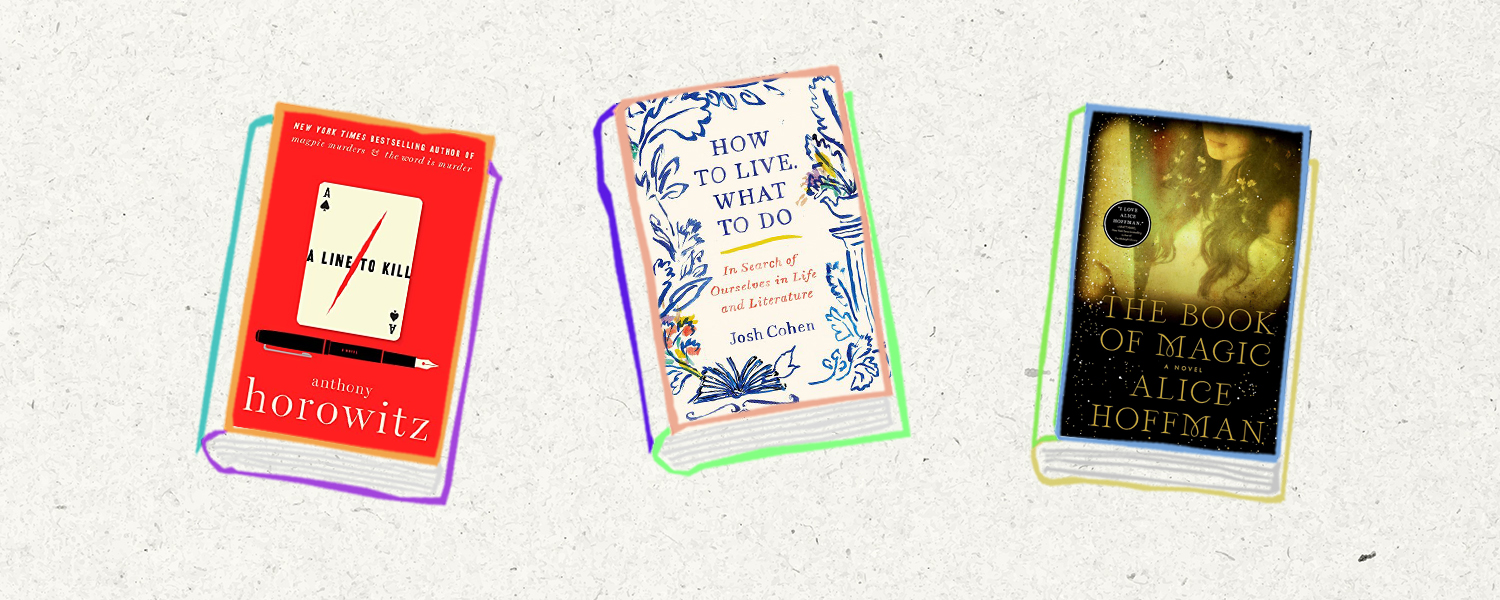
- Jewish author Alice Hoffman wraps up her “Practical Magic” series with “The Book of Magic,” a stunning final installation of the Owens sisters we know and love. (October 12)
- “A Line to Kill” by Anthony Horowitz is another delightful chapter in the mystery series that features a fictionalized version of the Jewish author himself. (October 19)
- Jewish author and activist Mattilda Bernstein Sycamore edits “Between Certain Death and Possible Future: Queer Writing on Growing up with the AIDS Crisis,” 36 personal essays on the “ongoing and persistent impact of the HIV/AIDS crisis in queer lives. (October 5)
- “In the Midst of Civilized Europe: The Pogroms of 1918-1921 and the Onset of the Holocaust” by Jefferey Veidlinger tells the story of pogroms in Ukraine and how they paved the way for the Holocaust. “Through stories of survivors, perpetrators, aid workers, and governmental officials, he explains how so many different groups of people came to the same conclusion: that killing Jews was an acceptable response to their various problems.” (October 26)
- Tom Vitale’s “In the Weeds: Around the World and Behind the Scenes with Anthony Bourdain” “takes readers behind the scenes to reveal the insanity of filming television in some of the most volatile places in the world and what it was like to work with a legend.” Vitale was the Jewish food host’s long time producer and director. (October 5)
- “How to Live. What to Do: In Search of Ourselves in Life and Literature” by Joshua Cohen focuses on questions about what it means to live through some of the best-known characters in literature (think Alice from “Alice’s Adventures in Wonderland,” or John Grimes in “Go Tell It on the Mountain”). A must-read for lovers of literature. (October 26)
- French Jewish public intellectual Bernard Hénri Levy (known as BHL in France) is releasing a new book, “The Will to See: Dispatches from a World of Misery and Hope,” which “follows the intrepid Lévy into eight international hotspots—in Nigeria; Syrian and Iraqi Kurdistan; Ukraine; Somalia; Bangladesh; Lesbos, Greece; Libya; and Afghanistan—that have escaped global attention or active response.” As the book jacket explains, “Part manifesto, part missives from the field, this new book is a stirring rebuke to indifference and an exhortation to level our gaze at those most hidden from us.” (October 26)
